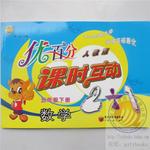题目内容
The family sphere(范围) used to be defined by its isolation from the public realm. There was the public male realm(领域)of "rational accomplishment" and cruel competition, and the private female and child-rearing sphere of home, intuition(直觉)and emotion. The private realm was supposed to be isolated from the realities of adult life. For both better and worse, television and other electronic media tend to break down the difference between those two worlds. The membrane around the family sphere is much more permeable(可渗透的). TV takes public events and transforms them into dramas that are played out in the privacy of our living rooms, kitchens and bedrooms.
Parents used to be the channel through which children learned about the outside world. They could decide what to tell their children and when to tell it to them. Since children learn to read in stages, books provide a kind of natural screening process, where adults can decide what to tell and not tell children of different reading abilities. Television destroyed the system that separated adult from child knowledge and separated information into year-by-year slices for children of different ages. Instead, it presents the same information directly to children of all ages, without going through adult filters.
So television presents a real challenge to adults. While a parent can read a newspaper without sharing it with children in the same room, television is accessible to everyone in that space. And unlike books, television doesn't allow us to flip(翻转)through it and see what's coming up. We may think we're giving our children a lesson in science by having them watch the Challenger take off, and then suddenly they learn about death, disaster and adult mistakes.
Books allow adults to discuss privately what to tell or not tell children. This also allows parents to keep adult material secret from children and keep their secret keeping secret. Take that same material and put it on The Today Show and you have 800,000 children hearing the very things the adults are trying to keep from them. "Television takes our kids across the globe before parents give them permission to cross the street."
More importantly, children gradually learn that adults are worried and anxious about being parents. Actually, television has also places families under a lot of stress.
How Television Changes Childhood?
Main comparisons | Contexts | |
Distance between __1._and the outside. | Homes used to be isolated from the ____2.__realm. | |
Homes nowadays are __3._to the outside world. | ||
Media through which children can obtain information | In the past, children might learn __4.__about the outside world with the help of parents and ___5.___. | |
More information is got directly through TV and other electronic media, which breaks down the __6.___ between adult world and the child world. | ||
___7.___ of the information children get | Traditionally, kids could only knew what they should learn at their age, carefully___8.__by their parents. | |
Everything can possibly be known by children, including many aspects of __9.__ life. | ||
Effects on family education | ||
Parental instruction | Families are now under greater stress than before. Adults are anxious about being parents and faced with new __10._____. | |
1.Homes
2.public
3.connected
4.indirectly
5.books
6.difference
7.Content
8.decided/ chosen
9.adult
10.challenges
【解析】
试题分析:本文是一篇议论性很强的文章。文中说到家庭范围是用来定义与公共领域隔离的区域,分为公共男性领域和私人女性领域以及育儿领域。私人领域应该远离成人生活的现实环境,但是现在,电视或者电子媒介逐步打破两个世界之间的不同,电视以一种戏剧的方式在人们的客厅、卧室、厨房报道和传播公共事件。父母是孩子了解世界的渠道,他们可以决定告诉孩子什么,什么时候告诉他们,但是,电视却没有经过父母的过滤,把相同的信息传递给所有年龄阶段的孩子,在教育孩子认识世界上面,电视给父母造成一种真实的挑战,并且给父母造成压力。
1.
2.
3.
4.
5.
6.
7.
8.
9.
10.
考点:考查议论文阅读

 优百分课时互动系列答案
优百分课时互动系列答案